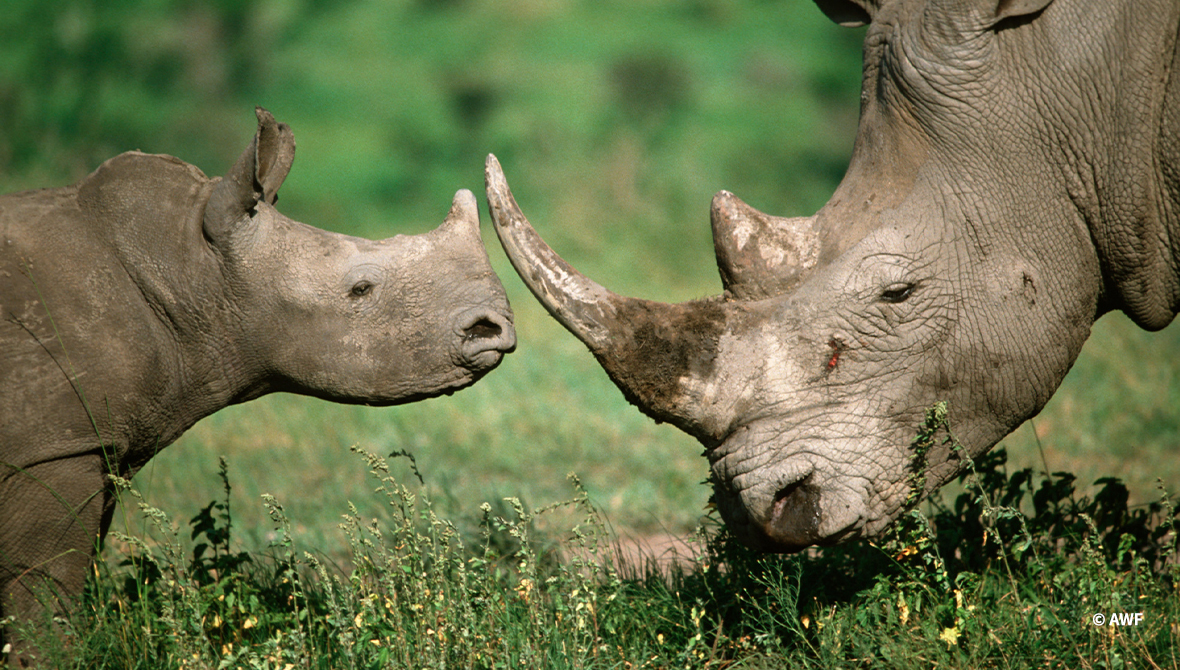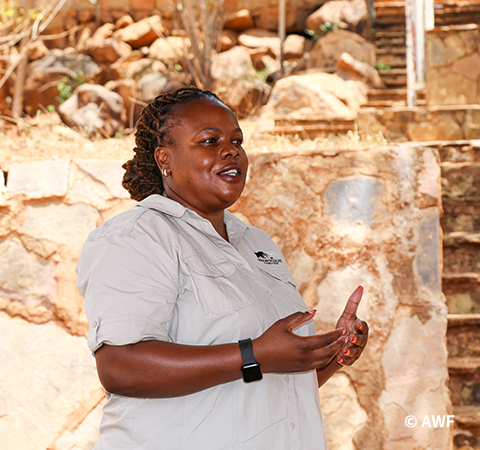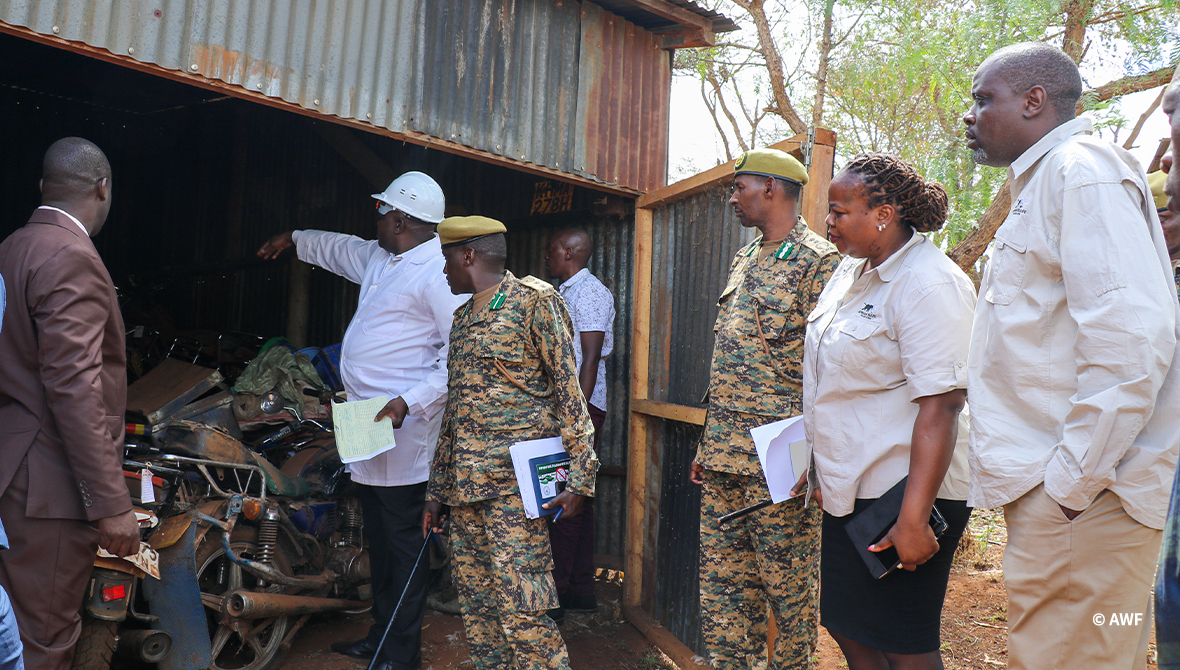Endangered Species Day: A Glimmer of Hope in the Fight Against Wildlife Trafficking

The recently published World Wildlife Crimes Report 2024 reveals that intensified conservation efforts have played a pivotal role in combating the illicit trade of elephant ivory and rhino horn. This report, released by the United Nations Office on Drugs and Crime (UNODC), underscores the African Wildlife Foundation’s (AWF) dedication to preserving endangered species across Africa’s diverse landscapes.
From 2015 to 2021, confiscated items from elephants, carnivores, and pangolins ranked among Africa and Asia's top five species groups. Specifically in Africa, items from pangolins, rhinoceros, and elephants accounted for over 95 percent of all seizures.
“The latest analyses provide grounds for some optimism that a combination of efforts from both demand and supply sides, with high-profile policy attention, greater market restrictions, and targeting of high-level traffickers with law enforcement action may be returning positive results,” the report notes.
The report’s conclusion underscores the apparent progress made in curbing poaching and the illegal trade of elephant ivory and rhinoceros horn over the past decade. This positive trend suggests that multifaceted interventions have yielded significant rewards, including policy engagement, law enforcement, and market suppression.
AWF has achieved significant strides in preserving endangered species throughout Africa. This success has been realized through government partnerships to devise and execute species action strategies. These efforts have led to the protection of mountain gorillas in Uganda and Rwanda, elephants in Tsavo and the Mid-Zambezi Valley, and the eastern black rhino in Kenya.
AWF implements a three-pronged strategy to stop the killing, trafficking, and demand for wildlife and wildlife products. In priority landscapes across Kenya, Tanzania, Uganda, the Democratic Republic of Congo, Cameroon, and Zimbabwe, AWF supports counter-wildlife trafficking programs. These programs train and equip wildlife scouts and rangers with the necessary skills and tools for ecological monitoring and protection of critical wildlife zones. These efforts have led to reduced trafficking and improved detection of wildlife crimes, thereby protecting endangered species.
As we mark this year’s Endangered Species Day, we spoke to Didi Wamukoya, AWF’s Director of Counter Wildlife Trafficking (CWT), who shared her insights into the report and discussed AWF’s response to threats facing endangered species in Africa.

Didi Wamukoya - AWF Director Counter Wildlife Trafficking, delivers her remarks during the commissioning of two evidence rooms in Kajiado and Tsavo East KWS stations on the 28th and 30th of March 2023 respectively.
Q: What are the key findings of the World Wildlife Crimes Report 2024 regarding wildlife crime in Africa?
Didi: The report underscores several critical points: wildlife trafficking remains persistent, affecting thousands of species; interventions need to be more strategic; corruption continues to drive wildlife trafficking; and organized criminal groups are increasingly involved in these crimes. These findings reveal the ongoing complexities of wildlife crime and highlight the need for a holistic approach to address these issues effectively. They also emphasize that wildlife crime is not just an environmental issue but a multifaceted problem that requires coordinated efforts across various sectors.
Q: How does AWF’s program address the challenges highlighted in the report, and what specific strategies have shown success?
Didi: AWF’s Counter Wildlife Trafficking (CWT) program tackles these challenges through several key strategies. We focus on capacity building for wildlife law enforcers, prosecutors, and investigators. Involving communities as part of the solution is another crucial aspect, as is using appropriate technology to enhance detection and prevention efforts. Moreover, we advocate for strong leadership within the wildlife sector and the implementation of robust policies and laws. These combined strategies have shown considerable success in mitigating wildlife crime.
Q: What are the socioeconomic and environmental impacts of wildlife crime on African communities and ecosystems?
Didi: Wildlife crime severely impacts communities by depriving them of valuable natural resources and economic opportunities, increasing insecurity, and leading to loss of livelihoods. It also poses health risks through the potential transmission of zoonotic diseases. Environmentally, illegal wildlife trade disrupts ecosystems, affecting biodiversity and the balance of natural processes. Additionally, many African cultures have deep connections to wildlife, with certain species playing significant roles in traditional beliefs and practices. The loss of these species can erode cultural heritage and disrupt traditional knowledge systems.
Q: What policy recommendations emerge from the report for enhancing the effectiveness of wildlife crime interventions?
Didi: The report calls for strengthening legal frameworks to reduce both the demand and supply of illegal wildlife products. Enacting and enforcing laws against organized crime and money laundering is crucial, as is strengthening governance structures to combat corruption. Law enforcement agencies need to be empowered to operate at their best, and communities should be engaged and given ownership of wildlife resources. Funding agencies can play a vital role by supporting these initiatives and ensuring that resources are allocated effectively.

From Far Right, AWF Manager, Cybercrime Investigations - Ernest Agina and AWF Director, Counter Wildlife Trafficking - Didi Wamukoya during the inspection of the KWS Kajiado Station Evidence Room
Q: Going forward, how can the World Wildlife Crimes Report 2024 findings guide future AWF initiatives and conservation strategies?
Didi: AWF will use the report’s findings to refine its existing conservation strategies and develop new approaches to address emerging threats. The report validates AWF’s holistic approach, which integrates our Counter Wildlife Trafficking Program with leadership cultivation, community engagement, public awareness, and international cooperation. This comprehensive strategy is vital for creating sustainable solutions to wildlife crime in Africa. Enhancing cross-sector collaboration involves fostering partnerships between conservation organizations, governments, law enforcement, and local communities to create a united front against wildlife crime.